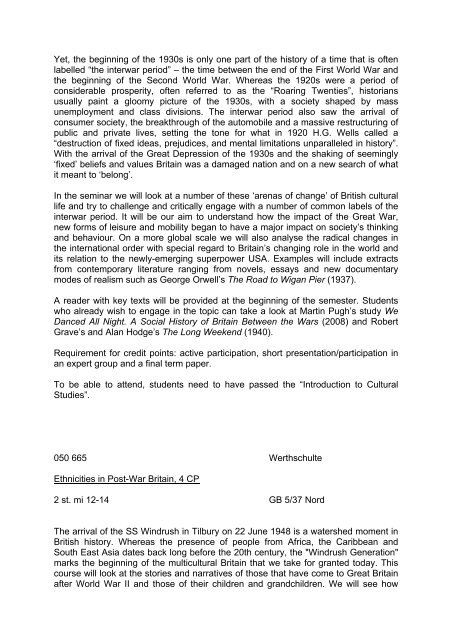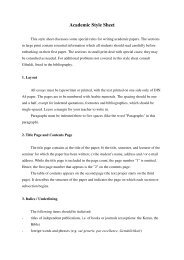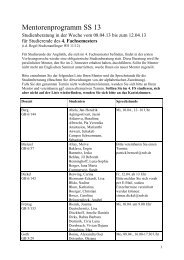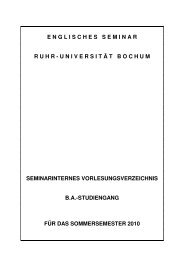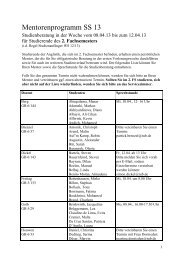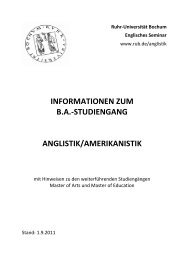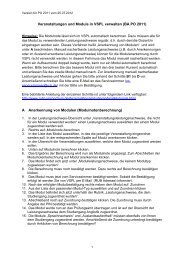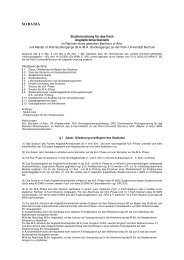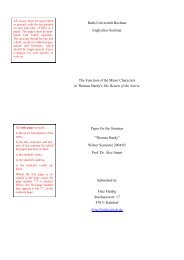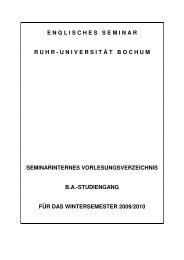Termine im WS 2012/13 - Englisches Seminar - Ruhr-Universität ...
Termine im WS 2012/13 - Englisches Seminar - Ruhr-Universität ...
Termine im WS 2012/13 - Englisches Seminar - Ruhr-Universität ...
Create successful ePaper yourself
Turn your PDF publications into a flip-book with our unique Google optimized e-Paper software.
Yet, the beginning of the 1930s is only one part of the history of a t<strong>im</strong>e that is often<br />
labelled “the interwar period” – the t<strong>im</strong>e between the end of the First World War and<br />
the beginning of the Second World War. Whereas the 1920s were a period of<br />
considerable prosperity, often referred to as the “Roaring Twenties”, historians<br />
usually paint a gloomy picture of the 1930s, with a society shaped by mass<br />
unemployment and class divisions. The interwar period also saw the arrival of<br />
consumer society, the breakthrough of the automobile and a massive restructuring of<br />
public and private lives, setting the tone for what in 1920 H.G. Wells called a<br />
“destruction of fixed ideas, prejudices, and mental l<strong>im</strong>itations unparalleled in history”.<br />
With the arrival of the Great Depression of the 1930s and the shaking of seemingly<br />
‘fixed’ beliefs and values Britain was a damaged nation and on a new search of what<br />
it meant to ‘belong’.<br />
In the seminar we will look at a number of these ‘arenas of change’ of British cultural<br />
life and try to challenge and critically engage with a number of common labels of the<br />
interwar period. It will be our a<strong>im</strong> to understand how the <strong>im</strong>pact of the Great War,<br />
new forms of leisure and mobility began to have a major <strong>im</strong>pact on society’s thinking<br />
and behaviour. On a more global scale we will also analyse the radical changes in<br />
the international order with special regard to Britain’s changing role in the world and<br />
its relation to the newly-emerging superpower USA. Examples will include extracts<br />
from contemporary literature ranging from novels, essays and new documentary<br />
modes of realism such as George Orwell’s The Road to Wigan Pier (1937).<br />
A reader with key texts will be provided at the beginning of the semester. Students<br />
who already wish to engage in the topic can take a look at Martin Pugh’s study We<br />
Danced All Night. A Social History of Britain Between the Wars (2008) and Robert<br />
Grave’s and Alan Hodge’s The Long Weekend (1940).<br />
Requirement for credit points: active participation, short presentation/participation in<br />
an expert group and a final term paper.<br />
To be able to attend, students need to have passed the “Introduction to Cultural<br />
Studies”.<br />
050 665 Werthschulte<br />
Ethnicities in Post-War Britain, 4 CP<br />
2 st. mi 12-14 GB 5/37 Nord<br />
The arrival of the SS Windrush in Tilbury on 22 June 1948 is a watershed moment in<br />
British history. Whereas the presence of people from Africa, the Caribbean and<br />
South East Asia dates back long before the 20th century, the "Windrush Generation"<br />
marks the beginning of the multicultural Britain that we take for granted today. This<br />
course will look at the stories and narratives of those that have come to Great Britain<br />
after World War II and those of their children and grandchildren. We will see how


